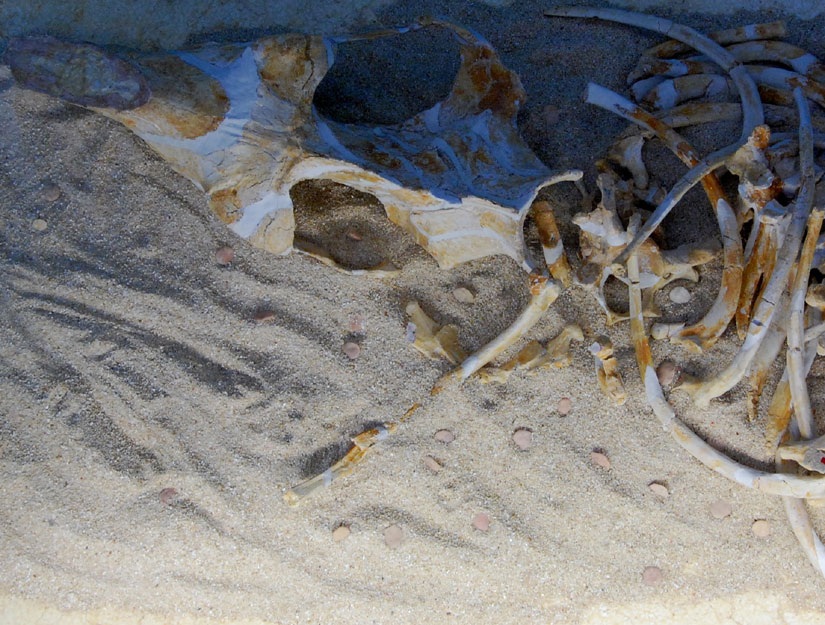Prehistoric Whale Done in By Shark, Frozen in Time
A rare 40-million-year-old shark and whale encounter is preserved in stone.
THE GIST
A 40-million-year-old battle between a shark and whale has been found preserved in decorative limestone.
The whale, which likely died as a result of the shark attack, represents a new species, Aegyptocetus tarfa.
The shark victim represents a transitional evolutionary stage for whales, when they spent time on land and in water.

By Jennifer Viegas
Mon Nov 7, 2011 02:00 PM ET
About 40 million years ago, a single shark in Egyptian waters snuck below a whale and attempted to rip it to shreds, but it wasn’t entirely successful.
The shark-bit and torn apart whale, described in the latest Journal of Vertebrate Paleontology, was recently discovered as a stonecutter in Italy prepared to slice into decorative limestone.
The whale, whose last moments were painful ones, turns out to represent a new species, Aegyptocetus tarfa, which lived on land as well as in the sea.
Co-author Giovanni Bianucci of the University of Pisa’s Department of Earth Sciences, told Discovery News it’s probable that the shark attacked the whale as it was “diving, considering that the bite was on the abdomen”
The whale may have fought back, because the shark did not completely consume its target, eventually releasing it either dead or dying. Over millions of years the whale’s body fossilized prior to being discovered by a shocked stonecutter from Italy who sliced it into decorative facing stone before realizing what he had found.
Normally scientists try not to cut such rare specimens, but since this one was already sliced, the researchers could see important details, enabling them to identify this as a transitional land-to-water whale. All whales evolved from a land animal that gradually started to rest, breed and give birth on land while feeding in the sea at other times.
Based on skull and skeleton measurements, Aegyptocetus weighed about 1,400 pounds when it was alive. Its teeth suggest that it primarily fed on fish.
This species lived in the middle of the great whale’s move to permanent ocean life. That transition started about 55 to 50 million years ago. Modern baleen and toothed whales didn’t evolve until around 30 million years ago.
Bianucci and Gingerich document how the newly found species displays characteristics of the transition, such as a retained sense of smell, which is usually lost in aquatic mammal lineages, the ability to haul itself out of water, and an enhanced ability to hear, with a better hearing than later and modern whales.
As for why whales chose the all-water life, the researchers suggest ample food might have been the irresistible draw. Gingerich explained that the whales probably first engaged in “scavenging of dead fish on a shoreline, then chasing dying fish in the water, then pursuing healthy fish farther offshore as well as the dying, and finally losing all ties to the land and becoming fully marine.”
Anthony Friscia, a researcher in the Department of Integrative Biology and Physiology at the University of California, Los Angeles, told Discovery News that “the most amazing thing about this discovery is the way it (the fossil whale) was found.”
“Not only was it fortuitous that it was spotted at all, but the fact that the skull…”
For the full article go here:
http://news.discovery.com/animals/prehistoric-shark-whale-111107.html
 Become A Sponsor!
Become A Sponsor!If you have a product or service that is a good fit for our surf community, we have opportunities for you to sponsor this blog! Download our media kit now!
